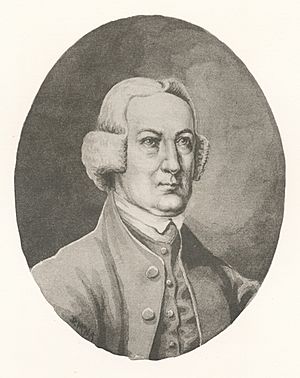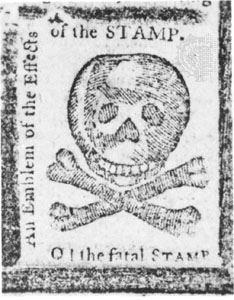Samuel Ward (Rhode Island politician) facts for kids
Quick facts for kids
Samuel Ward Sr.
|
|
|---|---|

Samuel Ward
|
|
| 31st and 33rd Governor of the Colony of Rhode Island and Providence Plantations | |
| In office 1762–1763 |
|
| Preceded by | Stephen Hopkins |
| Succeeded by | Stephen Hopkins |
| In office 1765–1767 |
|
| Preceded by | Stephen Hopkins |
| Succeeded by | Stephen Hopkins |
| 7th Chief Justice of the Rhode Island Supreme Court | |
| In office May 1761 – May 1762 |
|
| Preceded by | John Gardner |
| Succeeded by | Jeremiah Niles |
| Personal details | |
| Born | May 25, 1725 Newport, Rhode Island |
| Died | March 26, 1776 (aged 50) Philadelphia, Pennsylvania |
| Resting place | Common Burying Ground, Newport |
| Spouse | Anne Ray |
| Parents | Richard Ward, Mary Tillinghast |
| Occupation | Farmer, Politician, Chief Justice, Governor |
Samuel Ward (born May 25, 1725 – died March 26, 1776) was an important American leader. He was a farmer, a politician, and a judge. He also served as the governor of the Colony of Rhode Island and Providence Plantations. Later, he became a delegate to the Continental Congress, where he signed the Continental Association.
Samuel Ward was the son of Richard Ward, who was also a governor of Rhode Island. Samuel grew up in a large family in Newport, Rhode Island. He received a good education. After he married Anne Ray, they moved to Westerly, Rhode Island, and started a farm.
Ward became involved in politics when he was young. He took a strong stand on money issues, preferring "hard money" (coins) over "paper money." His main political rival was Stephen Hopkins from Providence. These two men often ran against each other for governor, and they took turns holding the office.
During his time in politics, Ward helped start Brown University. One of the biggest challenges he faced as governor was the Stamp Act. This law was passed by the British Parliament and angered many American colonists. Samuel Ward was the only colonial governor who bravely refused to support it. This made him famous as a great Patriot.
Ward's last term as governor ended in 1767. He then returned to his farm. In 1774, he was called back to serve as a delegate to the Continental Congress. He worked hard to prepare the colonies for a possible war with England. He sadly died from smallpox during a meeting of the Congress in Philadelphia. This was just three months before the American Declaration of Independence was signed.
Early Life and Family
Samuel Ward was born in Newport, Rhode Island, in 1725. His father, Richard Ward, was the governor of the colony. His mother was Mary Tillinghast. Samuel was one of 14 children in his family.
He grew up in a cultured home and attended a well-known grammar school in Newport. He might have also been taught by his older brother, Thomas, who went to Harvard College.
As a young man, Samuel married Anne Ray. Her father was a wealthy farmer from Block Island. He gave the couple land in Westerly, where they settled and became farmers. Samuel worked hard to improve his farm animals. He even raised a special type of racehorse called the Narragansett Pacer.
Family and Legacy
Samuel and Anne Ward had eleven children. Their second son, Samuel Ward, Jr., became a lieutenant colonel in the 1st Rhode Island Regiment during the Continental Army.
A famous great-granddaughter of Samuel Ward was Julia Ward Howe. She wrote the well-known song "Battle Hymn of the Republic".
In 1937, the town of Westerly honored Samuel Ward. They named their high school after him. Later, the school was renamed Westerly High School, but its main auditorium still carries his name.
Ward also owned a special dressing table. This table is now kept at the Chipstone Foundation in Milwaukee, Wisconsin. It is an example of Queen Anne style furniture. A cabinetmaker named Job Townsend, Sr., made it in 1746.
Political Career
Samuel Ward first entered politics in 1756. He was elected as a representative from Westerly. At that time, a big debate was happening about money. Some people wanted "hard money" (gold and silver coins). Others preferred "paper money." Ward strongly supported hard money.
His main political opponent was Stephen Hopkins from Providence. Hopkins supported paper money. The two men had a very strong rivalry. They often ran against each other for governor. For ten years, they took turns being the colony's leader.
In 1761, Ward was chosen to be the chief justice of the Rhode Island Supreme Court. He served in this role for one year. Then, in 1762, he was elected governor for the first time. During this period, there was talk of starting a college in Rhode Island. Ward strongly supported this idea. He played a big part in creating "Rhode Island College," which later became Brown University. When the school officially started in 1765, he was one of its first trustees and a generous supporter.
The Stamp Act

In 1765, Samuel Ward won the election for governor again. Just before he took office, the British Parliament passed the Stamp Act. This law was a way for Britain to tax the American colonies. It said that all official documents and newspapers had to be printed on special stamped paper. This paper was sold by government officers at a set price. The act also added taxes on sugar, coffee, and other goods. It even required that lumber and iron from the colonies could only be sent to England.
The colonists were very angry about this act. They felt it was unfair because they had no say in the British Parliament. Samuel Adams from Massachusetts suggested that all the colonies send delegates to a meeting in New York. They wanted to discuss how to deal with these unfair taxes.
In Rhode Island, the General Assembly passed resolutions against the Stamp Act. The person appointed to sell the stamps in Rhode Island, Augustus Johnson, refused to do his job. He said he would not go "against the will of our Sovereign Lord the People."
The day before the Stamp Act was supposed to start, all the royal governors had to promise to support it. But Samuel Ward was the only colonial governor who refused. He knew this could cost him his job and lead to a huge fine. But he stood firm. Eventually, the Stamp Act was canceled, which brought great joy to the colonies. This conflict helped set the stage for the American Revolution.
Serving in Congress
"When I first entered this contest with Great Britain, I extended my view through the various scenes which my judgment or imagination pointed out to me. I saw clearly that the last act of this cruel tragedy would close in fields of blood. I have traced the progress of this unnatural war through burning towns, devastation of the country and every subsequent evil. I have realized with regard to myself, the bullet, the bayonet, and the halter; and, compared with the immense object I have in view, they are all less than nothing. ... Heaven save my country, is my first, my last, and almost my only prayer."
In 1767, Ward lost the governor's election to Stephen Hopkins again. However, their rivalry eventually ended, and they became friends. Ward retired to his farm in Westerly.
In 1774, he was called back to public service. The people of Providence suggested forming a Continental Congress to unite the colonies. This idea quickly gained support. The General Assembly in Newport chose Ward and Hopkins as delegates to this important Congress.
Ward worked on several key committees in the Continental Congress. He often led meetings when the Congress discussed important matters. He dedicated all his energy to this work. Sadly, he died from smallpox during a meeting in Philadelphia. This happened just over three months before the Declaration of Independence was signed. He was first buried in Philadelphia, but his remains were later moved to the Common Burying Ground in Newport, Rhode Island, in 1860.
 | Charles R. Drew |
 | Benjamin Banneker |
 | Jane C. Wright |
 | Roger Arliner Young |

